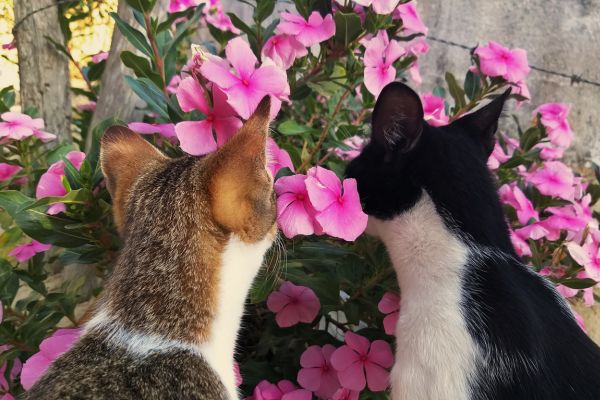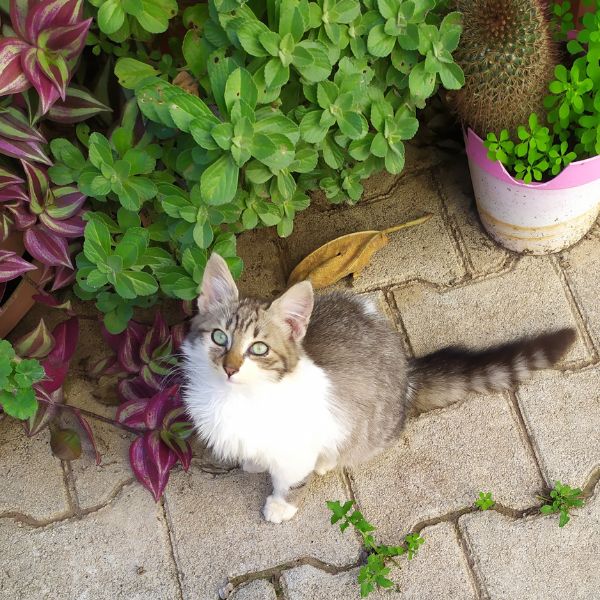There are many things pet parents should consider when it comes to raising happy and healthy cats. Feeding them age-appropriate nutritious food is a top concern, but so is providing them with mental and physical stimulation on a regular basis. Moreover, grooming them and keeping their surroundings clean (especially their litter box) are musts. When it comes to their home environment, curious kitties should be around things that won’t cause them harm. This includes indoor ornamental plants as well as backyard blooms that do not contain natural toxins.
Whether you’re thinking about growing plants or are just mildly interested in them, your cat’s health always comes first. Be a responsible pet parent by looking through this handy list. Find out which commonly searched plants are non-toxic and toxic for your feline pet. Doing so may help prevent future accidents and save her life.
In this blog post, we list down:
- Non-toxic plants for cats
- Toxic plants for cats
- Other plant considerations to take note of
- General reminders
Remember, all the information shared in this post is only meant to help cat parents familiarise themselves with popular species of indoor and outdoor plants. This guide should never replace getting your vet’s approval in growing a certain plant on your property.
Non-toxic plants for cats:
The roots, branches, leaves, fruits, and flowers of the listed plants below do not have toxic principles in them. However, this doesn’t necessarily mean that your cat is completely safe if she tries to eat the plant. Accidental choking may result from consuming a plant’s tough parts. She may also experience dental injury, upset stomach, or intestinal obstruction from the plant matter. Additionally, some fruits may contain poisonous substances in their unripe form:
- Air plants
- Banana plants (though its fruits are non-toxic, they’re not recommended for cat consumption due to high sugar and carbohydrate content)
- Basil plants (the herb can be eaten by your cat as long as she is not allergic to it)
- Calathea plants [genus]
- Cast iron plants
- Celosia plants [genus]
- China doll plants
- Cucumber plants (cats can actually eat its fresh fruit occasionally)
- Fuchsia plants [genus]
- Green bean plants (moderate snacking is allowed as long as they’re cooked correctly)
- Hoya plants [genus] (the hoya heart is one of its popular species)
- Lipstick plants
- Money plants
- Nerve plants [genus]
- Orchid plants
- Peacock plants
- Pineapple plants (cats can eat its ripe fruit following some caveats)
- Polka dot plants (the pink polka dot plant is one of its well-known variegated species)
- Prayer plants
- Raindrop plants
- Rattlesnake plants
- Spider plants
- Strawberry plants (occasional and moderate feeding of its fresh fruits are allowed)
- Swedish ivy plants
- UFO plants
- Zebra plants

Toxic plants for cats:
Your cat may experience a variety of symptoms depending on the type of plant she encounters. The plant’s toxins can be released when your cat rubs her body against it, or if she bites into the leaves, flowers, and other parts. Mild effects can manifest as skin and mucous membrane irritation. On the other hand, plants with strong toxic principles can cause gastrointestinal and neurological effects:
- Agave plants [genus]
- Aloe plants [genus]
- Avocado plants (its fruit should not be fed to cats)
- Begonia plants [genus]
- Birkin plants
- Chinese evergreen plants
- Coffee plants
- Coleus plants [genus]
- Cordyline plants [genus]
- Corn plants (don’t confuse this plant for the starchy kernels cats can eat in limited amounts)
- Croton plants
- Dracaena plants [genus]
- Elephant ear plants [genus]
- Ficus plants [genus]
- Fiddle leaf plants
- Hyacinth plants [genus]
- Jade plants
- Jalapeño plants (however, non-spicy bell peppers can be grown and fed to your pet)
- Lavender plants [genus]
- Lemon plants (feeding its fruit to your cat is also a no-no)
- Mass cane plants
- Monstera plants [genus]
- Onion plants (never let your cat consume onions)
- Panda plants
- Peace lily plants
- Philodendron plants [genus]
- Potato plants (do not allow your cat to eat raw potatoes)
- Pothos plants [genus]
- Rubber plants
- Schefflera plants [genus]
- Shamrock plants
- Snake plants
- String of pearl plants
- Swiss cheese plants
- Tomato plants (do not let your cat eat its unripe fruits)
- Tulip plants
- Wandering Jew plants
- ZZ plants
If you suspect that your cat came across any of these toxic plants below, contact your vet immediately. Put her in an enclosed space for close observation
Other plant considerations to take note of:
It comes as no surprise that there are many plants with the same names. These include but are not limited to bamboo plants, fern plants, ivy plants, palm plants, pitcher plants, and umbrella plants. Since they belong to different families, one kind may have toxins while the other may be harmless for your cat. Various sources state that true bamboo, true fern, and true palm plants are non-poisonous for feline pets.
Similarly, there are some terms that may cover multiple plant orders. Succulents, which are known for their thick, fleshy, and engorged leaves, currently have about 60 plant families. This includes all types of cacti, which are classified under the Cactaceae family.
In addition, some plants may also be categorised according to where they originate. Tropical plants, for example, are native to regions surrounding the equator. However, plant buyers shouldn’t rely on these general terms to determine if the plant can be grown around their pets.
The fastest way to know if a plant is safe or toxic is by looking up its scientific name, and searching for it on websites such as ASPCA and Pet Poison Helpline.

General reminders:
In some cases, your cat may be fond of munching on grass and may become intrigued by the foliage of your new houseplant. The grazing behaviour is actually common, as some cats nibble on grass to relieve anxiety, assist her bowel movement, deal with a gastrointestinal issue, or induce vomiting to clean out her system. But if your cat suddenly picks up this new habit, discuss it with your vet to eliminate any underlying health conditions.
Take note that young kittens and senior cats may be in more danger around plants because of their delicate constitutions or existing health issues. So always put this into consideration before you decide to grow new plants. Though there are many creative ways to cat-proof your indoor garden, it’s best to choose non-toxic varieties and place them in no-cat zones or hard-to-reach areas. In addition, choose sturdy pots that won’t topple easily.
Also, factor in the type of non-toxic plant you bring in. If your cat is fond of chewing plant leaves, refrain from choosing ones with tough foliage and stems that can break her teeth or injure her jaw. Thorny shrubs are also a big no-no, especially if your cat enjoys rubbing her body against plants.
As a rule, never apply chemicals on your plants or its soil that may put your cat at risk. Pet Poison Helpline lists the dangerous ingredients that can be found in fertilisers. These include nitrogen, phosphorus, potassium, iron, copper, zinc, cobalt, boron, manganese, and molybdenum. Fertilisers mixed with pesticides, herbicides, and fungicides can also lead to mild to severe symptoms. Depending on your cat’s size and how much fertiliser she ate, she may experience mild stomach upset, severe poisoning, bowel obstruction, or pancreatitis. With your vet’s consent, choose pet-safe fertilisers or try natural alternatives that can deter pests.
Cats and plants can co-exist harmoniously in one space. The first step is to find the right ones that won’t harm your beloved furry friends.
Leave a comment
Your email address will not be published. All fields are required.